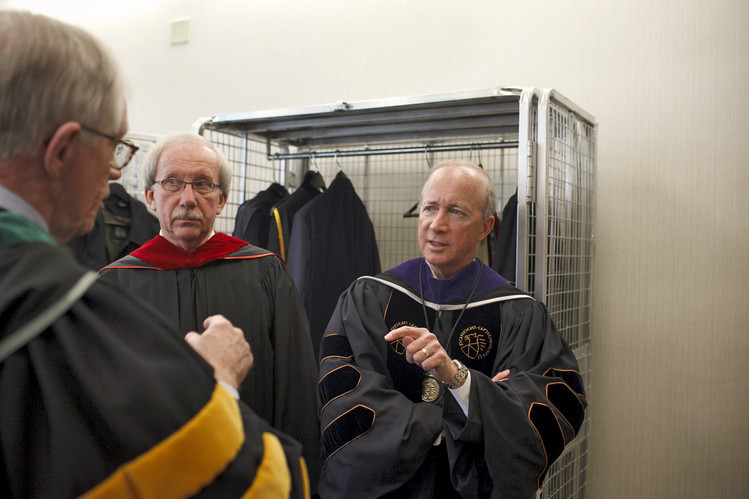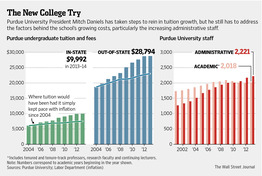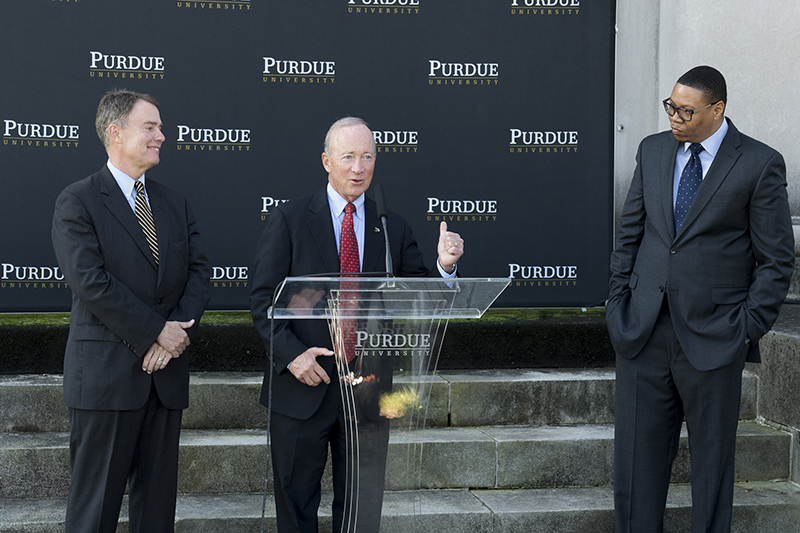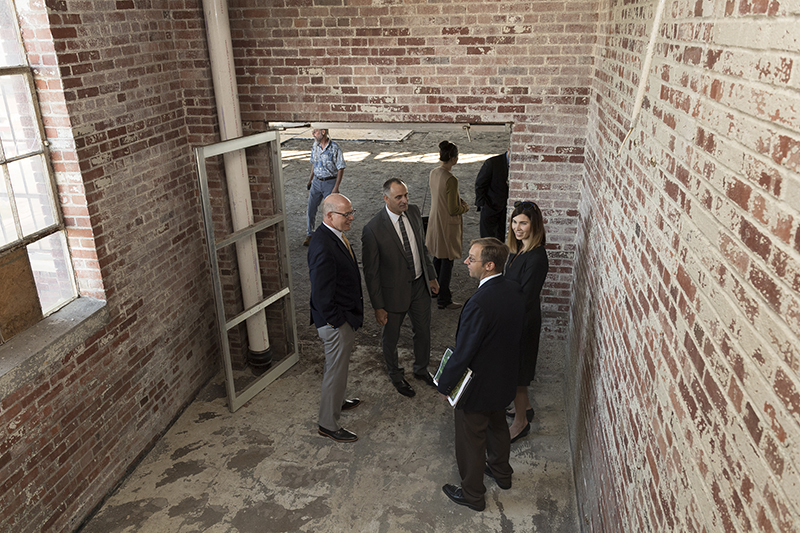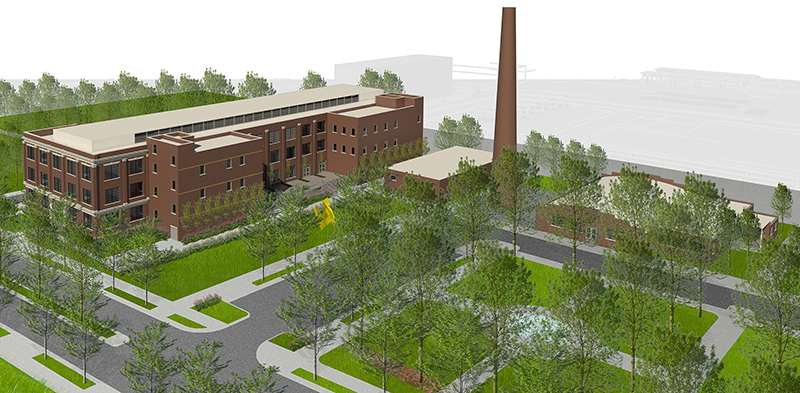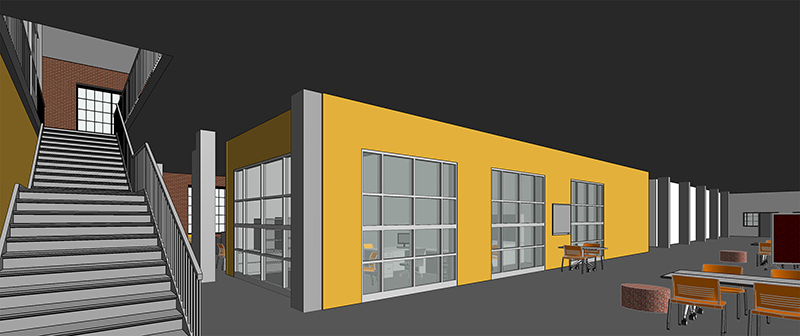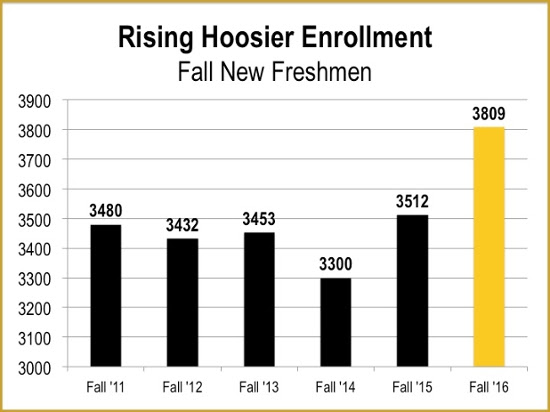90% of the budget of academic units is salary. There was no obvious wasteful ways. The academic side is getting Burked.
Not true. This article is from the Wall Street Journal....
At Purdue, a Case Study in Cost Cuts
Former Indiana Gov. Mitch Daniels, Now University President, Spurs Rethinking on Value of a Degree
ENLARGE
Purdue University President Mitch Daniels, at right in graduation garb, has been slashing expenses to keep students' costs in check.TAYLOR GLASCOCK FOR THE WALL STREET JOURNAL
By
DOUGLAS BELKIN
Updated July 25, 2014 7:22 p.m. ET
82 COMMENTS
WEST LAFAYETTE, Ind.—Three months into his tenure as president of Purdue University,
Mitch Daniels leaned over a table covered with financial statements and pointed to items labeled "cash" sprinkled throughout the pages.
"That's part of the endowment, right?" Mr. Daniels asked the school's treasurer. "Nope," the treasurer said, "that's cash."
Mr. Daniels suggested the rainy-day funds, which totaled "somewhere in the mid-nine figures" and were kept by a host of academic departments for operating expenses, be moved out of low-interest-bearing accounts and put to better use.
It was the first of many steps Mr. Daniels has taken as he seeks to reorganize Purdue's sometimes-antiquated systems. A year and a half into his tenure, Mr. Daniels has frozen tuition (for the first time in 36 years), cut the cost of student food by 10% and introduced volume purchasing to take advantage of economies of scale.
In May, he rolled out the first results from a Gallup poll of 30,000 college graduates from hundreds of schools aimed at discerning what value a university education adds to a person's success and well-being. The results have shed new light on a question that has moved to center stage in higher education: What is the real return on investment for a college degree?
With the poll, the former two-term Republican governor of Indiana is drawing a line in the sand against which U.S. higher education can be measured. And by freezing tuition, he is forcing his own school to modernize its 19th-century business model with a combination of systemic cuts, organizational realignments and cash incentives.
"This place was not built to be efficient," Mr. Daniels said when asked about the structural changes he was making at Purdue. But "you're not going to find many places where you just take a cleaver and hack off a big piece of fat. Just like a cow, it's marbled through the whole enterprise."
ENLARGE
Jamie Merisotis, president of the Lumina Foundation, a nonprofit focused on increasing postsecondary credentials in the U.S. that teamed with Purdue to produce the Gallup survey, lauded Mr. Daniels's efforts. "He understands that higher education has to evolve to serve the nation's needs," he said.
The stress fractures created by forcing tradition-bound institutions to play by new rules has put university presidents across the country in the cross hairs as they are caught between boards of trustees demanding change and faculties urging caution. Mr. Daniels's path to consolidating support on his own campus hasn't been without friction.
Soon after taking over as president, faculty questioned his commitment to academic freedom over emails he sent as governor lambasting leftist historian Howard Zinn and asking if his books were being taught in Indiana. Instead of backing off, Mr. Daniels doubled down on his criticism of Mr. Zinn's writings. Campus protests ensued.
A few months later, Mr. Daniels kicked up a second dust storm by using a university plane to fly to a conservative conference. After this blowup, he promised to steer clear of partisan politics during the rest of his tenure as president.
His actions—and a charm offensive conducted around lunch and dinner tables—have helped smooth the bumps. Last fall, the marching band spelled out M-I-T-C-H during the halftime of the Purdue-Notre Dame football game. Then Mr. Daniels won a standing ovation as he drove his Harley-Davidson onto the field.
Still, criticism has come from both directions. Some think he is moving too fast, others not fast enough when it comes to cutting student costs.
"A [tuition] freeze is nice but it seems to me the goal should be to chip away at some of costs that have made tuition go up," said Bekah Ticen, a 22-year-old English major who just graduated and is one of eight children of an Indiana factory worker. Even with Mr. Daniels's efforts, "tuition has gone up $1,000 a year since I've been here," she said. "Where is it all going?"
Most covers diminishing state subsidies. Mr. Daniels cut millions from state higher education as governor, but millions more pay for the administrative salaries that have ballooned at Purdue, along with most universities around the country. At Purdue, there are now 75% more administrators and staff on the payroll than there were 13 years ago.
J. Paul Robinson, a former president of the faculty senate, said Mr. Daniels's worth as a leader will be tied to his ability to prune that administrative bloat. "Let me put it this way," Mr. Robinson said: "A blind man on a galloping horse at midnight with sunglasses on can see the problem. The question is, What can he do about it?"
Mr. Daniels says he is consolidating administrative jobs where prudent and leaving jobs unfilled where the duplication of effort makes that possible. He has jettisoned 10 university cars, consolidated hundreds of thousands of feet of off-campus rental storage and introduced a higher-deductible health-care plan.
He has also created two, half-million-dollar prizes for the first department that devises a three-year degree or a degree based on what a student already knows, not the number of hours he or she sits in a class. This summer, the school offered 200 more classes than last year in an effort to speed time to degree and generate more income for the school.
"There's lots of opportunities" to cut costs, he said.
Meanwhile, the Gallup poll has already begun to reframe the national debate about what gives colleges value at a time when many people, including Mr. Daniels, foresee a shakeout in higher education after years of higher costs.
From his spacious corner office overlooking Purdue's quad, Mr. Daniels says that changes in higher education will create opportunities for those who are prepared. "There is real opportunity during a down market," he said. "If we handle ourselves well, on the other side of this we can get stronger."
